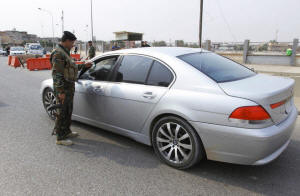|
Sunni Arabs forced to leave Kirkuk after
Islamic State attack, residents say
 Send a link to a friend
Send a link to a friend
 [October 25, 2016]
KIRKUK, Iraq (Reuters) - Hundreds of
displaced Sunni Arab families have had to leave Kirkuk after an Islamic
State attack on the Kurdish-controlled city which authorities suspect
was helped by Sunni sleeper cells, humanitarian workers and residents
said on Tuesday. [October 25, 2016]
KIRKUK, Iraq (Reuters) - Hundreds of
displaced Sunni Arab families have had to leave Kirkuk after an Islamic
State attack on the Kurdish-controlled city which authorities suspect
was helped by Sunni sleeper cells, humanitarian workers and residents
said on Tuesday.
The Sunni families, who had been sheltering in Kurdish-controlled Kirkuk
province from the conflict with Islamic State, began moving out after
authorities told them on Sunday to leave or face being forcibly
expelled, the sources said.
About 330,000 Sunni Arabs have taken refuge in the oil-rich Kirkuk
province in the last two years, after Islamic State swept through
northern, central and western Iraq in 2014.
Some had fled because of the fighting and others because of the hardline
Sunni group's harsh rules and the difficult living conditions in their
villages and towns.
Islamic State fighters stormed police stations and buildings in Kirkuk
on Friday, killing about 100 security force members and civilians.
Sixty-three militants also died in the heavy fighting that lasted until
Sunday, when authorities restored control.

The jihadists carried out the operation to relieve pressure on Mosul,
the last major city stronghold of Islamic State in Iraq, where the group
is fighting off an offensive by Iraqi army units and Kurdish forces
backed by a U.S.-led coalition.
The militants are suspected to have come from Hawija, a pocket still
under their control west of Kirkuk, but authorities also suspect that
they were assisted by sleeper cells hiding among the displaced people or
even by Sunni Arab residents.
More than 250 families were counted leaving at a main exit checkpoint on
Monday and more were crossing on Tuesday, a local humanitarian worker
said, adding that some were heading to other camps for displaced people
and others trying to return home.
[to top of second column] |

A policeman checks a driver's identification at a checkpoint in
Kirkuk, Iraq, October 24, 2016 REUTERS/Ako Rasheed

Spokespeople at the migration ministry in Baghdad and the Kurdish
provincial authorities declined to comment.
Kirkuk is the most disputed area of Iraq because of its complex
population mix. The Kurds took full control of the province in 2014
after Islamic State overran much of the north of the country and
several divisions of the Iraqi army disintegrated.
Arabs complain that Kurds have since flooded to Kirkuk to tilt the
demographic balance, while Kurds say they are simply redressing
historic wrongs perpetrated by Saddam Hussein, the Sunni Arab leader
toppled by the United States in 2003.
Saddam's policy of "Arabisation" in the north during his quarter
century in power led to many Kurdish villages being razed and
hundreds of thousands of people being displaced to ensure Arab
dominance over local Kurds, Turkmen and Assyrian Christians.
(Reporting by Maher Chmaytelli and Saif Hameed in Baghdad; editing
by Dominic Evans)
[© 2016 Thomson Reuters. All rights
reserved.]
Copyright 2016 Reuters. All rights reserved. This material may not be published,
broadcast, rewritten or redistributed.
 |